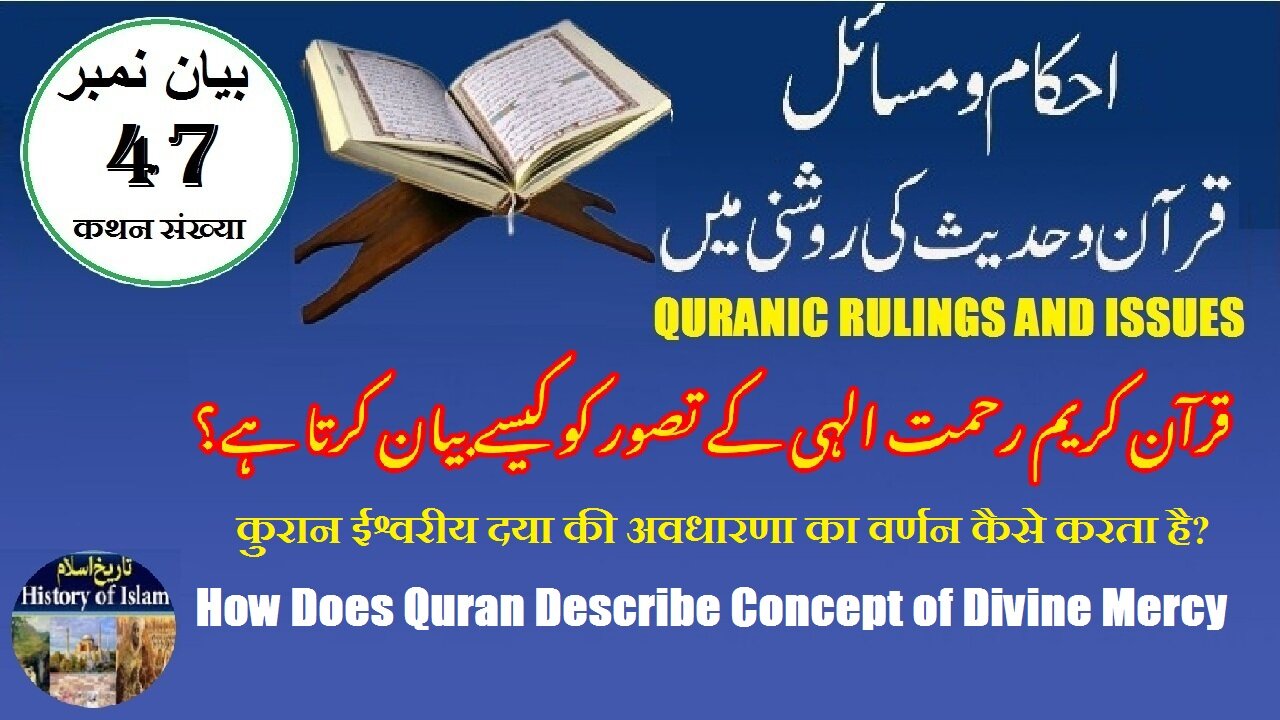Premium Only Content

How Does Quran Describe Concept of Divine Mercy | قرآن کریم رحمت الہی کے تصور کو کیسے بیان کرتا ہے؟
@islamichistory813 #quran #describe #concept #divine #mercy #islamicbayan #seriesofstatement #statement47 #bayan47
How Does the Quran Describe the Concept of Divine Mercy?
Assalamu Alaikum sisters, brothers, friends and elders:
We welcome you to Statement Number 47 in our series of statements. We will explain in it that: (How Does the Quran Describe the Concept of Divine Mercy? ), our aim is to learn and teach from the Quran and Sunnah, reflect on history and seek solutions to problems with divine guidance.
How Does the Quran Describe the Concept of Divine Mercy?
One of the most profound and recurring themes in the Holy Quran is the concept of divine mercy. Allah introduces Himself as “Ar-Rahman” and “Ar-Rahim,” the Most Merciful and the Most Compassionate, at the beginning of almost every chapter. This constant reminder highlights that mercy is the foundation of Allah’s relationship with His creation. The Quran portrays divine mercy as limitless, encompassing every aspect of existence, guiding humanity, forgiving sins, and providing sustenance.
Allah declares in the Quran, “My mercy encompasses all things” (Surah Al-Araf 7:156). This verse affirms that no being, whether human, animal, or any part of creation, is excluded from Allah’s mercy. It flows through every detail of the universe, from the rising of the sun to the falling of rain, and from the provision of food to the gift of life itself. This universal mercy extends to both believers and disbelievers, as Allah provides sustenance and opportunities to all.
The Quran describes mercy as the central reason behind divine revelation. Allah says, “And We have not sent you, O Muhammad, except as a mercy to the worlds” (Surah Al-Anbiya 21:107). The Prophet Muhammad peace be upon him was not only a bearer of guidance but also a manifestation of divine mercy. His mission was to uplift humanity, save them from ignorance, and show the path to eternal success. This verse shows that divine mercy is not abstract but active, working through prophets, revelations, and guidance.
Divine mercy is also tied to forgiveness. In Surah Az-Zumar, Allah says, “Say, O My servants who have transgressed against themselves, do not despair of the mercy of Allah. Indeed, Allah forgives all sins. Indeed, it is He who is the Forgiving, the Merciful” (Surah Az-Zumar 39:53). This verse is one of the most hope-inspiring messages in the Quran. It teaches that no matter how great a sin may be, Allah’s mercy is greater, provided the servant turns to Him in sincere repentance. This reflects the boundless nature of His compassion and forgiveness.
The Quran also contrasts divine mercy with human shortcomings. Allah reminds humanity that He does not hasten punishment despite people’s sins. “If Allah were to impose blame on the people for what they earned, He would not leave upon the earth any creature, but He defers them for a specified term” (Surah Fatir 35:45). This delay in punishment itself is a form of mercy, granting people time to reflect, repent, and return to their Creator.
The Hadith literature further clarifies the depth of Allah’s mercy. In Sahih Bukhari, the Prophet Muhammad peace be upon him said: “When Allah completed the creation, He wrote in His Book which is with Him on His Throne: ‘My mercy overpowers My wrath’” (Sahih Bukhari, Hadith 3194). This hadith highlights that while Allah is capable of punishing wrongdoers, His mercy is dominant and surpasses His anger. It reassures believers that they are dealing with a Lord who prefers forgiveness over punishment.
Another narration in Sahih Muslim explains the vastness of divine mercy. The Prophet Muhammad peace be upon him said: “Allah has divided mercy into one hundred parts, and He sent down one part of it among the jinn and human beings and animals and insects, through which they love one another, show kindness to one another, and through which even an animal lifts its hoof away from its young one fearing that it might harm it. And Allah has kept ninety-nine parts with Him” (Sahih Muslim, Hadith 2752). This shows that all the compassion we see in the world is only a fraction of Allah’s mercy, while the greater portion awaits in the Hereafter.
The Quran also links divine mercy with guidance and paradise. Allah says, “As for those who believed and did righteous deeds, their Lord will guide them by their faith. Beneath them rivers will flow in the Gardens of Pleasure” (Surah Yunus 10:9). The reward of paradise itself is a manifestation of divine mercy, as no one can enter paradise by deeds alone but only through Allah’s grace. The Prophet Muhammad peace be upon him clarified this when he said: “None of you will enter Paradise because of his deeds alone.” They asked, “Not even you, O Messenger of Allah?” He said, “Not even me, unless Allah shows mercy to me” (Sahih Muslim, Hadith 2816).
At the same time, the Quran warns against taking mercy for granted. Mercy is vast, but it is reserved in its full form for those who turn back to Allah in repentance and faith. Allah says, “But My mercy encompasses all things, so I will decree it for those who fear Me and give zakah and those who believe in Our verses” (Surah Al-Araf 7:156). This verse shows that while mercy is universal, its special share is for the believers who strive to live righteously.
In summary, the Quran describes divine mercy as universal, infinite, and greater than human comprehension. It is expressed in creation, revelation, forgiveness, guidance, and the promise of paradise. Hadith literature expands on this by showing that even the smallest acts of compassion in the world are reflections of Allah’s greater mercy. For believers, the concept of divine mercy offers hope, comfort, and encouragement to repent and strive for righteousness. At the same time, it serves as a reminder that true reliance is not on one’s deeds alone but on the mercy of Allah.
The emphasis on divine mercy in the Quran is a message of hope for every generation. It assures humanity that despite mistakes and weaknesses, Allah’s door of forgiveness is always open. It calls the believer to humility, gratitude, and constant remembrance of the Most Merciful, who embraces His creation with compassion in this world and promises eternal mercy in the Hereafter.
We conclude today's discussion with this humble supplication: O Allah, purify our hearts, accept our deeds, forgive our sins, and include us among Your grateful servants. Amen
Allah Hafiz
#qurantafseer #hadithlessons #ilmdeen #quranwisdom #rozanabayan #sunnahteachings #imanibaatain #islamicknowledge #masailkaahal #quranstories #deenreminder #hadithseikhtalat #islamicsolutions #ilmokhikmat #dailybayan #sunnatseekhain #islamicevents #deenikahaniyan #quranmessage #islamiclessons #islamiwaqiat #bayanseries #quranreminder #islamicwisdom
==================================
-
 1:48
1:48
ISLAMIC HISTORY
1 day agoSurah At Taubah Verse No 112 تلاوت َسورة اَلتَّوْبَة اردو اور انگریزی ترجمے کے ساتھ آیت نمبر
4 -
 LIVE
LIVE
Side Scrollers Podcast
2 days ago🔴SIDE SCROLLERS FUND-A-THON🔴DAY 2🔴100% REVENUE HELPS CHANGE CULTURE!
1,058 watching -
 LIVE
LIVE
Flyover Conservatives
20 hours agoURGENT UPDATE: Why Halloween Matters This Year— October 24-31 w/ Bo Polny | FOC Show
600 watching -
 LIVE
LIVE
This is the Ray Gaming
19 minutes agoI'm All Out Of Tacos | Rumble Premium Creator
19 watching -
 LIVE
LIVE
SpartakusLIVE
3 hours agoHE'S BACK || The #1 KING of Content has ARRIVED
173 watching -
 LIVE
LIVE
Spartan
4 hours agoOMiT Spartan | Graduated college woohoo and last stream before worlds
11 watching -
 30:55
30:55
Producer Michael
8 hours agoFINALLY....Something Different!!
3.09K1 -
 LIVE
LIVE
Patriots With Grit
5 hours agoRemdesivir + Fentanyl Death Sentence: The "Mad Dog" Tragedy | Lauri Madigan
31 watching -
 LIVE
LIVE
Anthony Rogers
6 hours agoEpisode 387 - Crash Your Party
32 watching -
 1:26:56
1:26:56
Glenn Greenwald
5 hours agoTrump's War Against Thomas Massie and Rand Paul; Exposing Corrupt Foreign Influence and DC Rot: With Kenneth P. Vogel | SYSTEM UPDATE #535
78.3K58